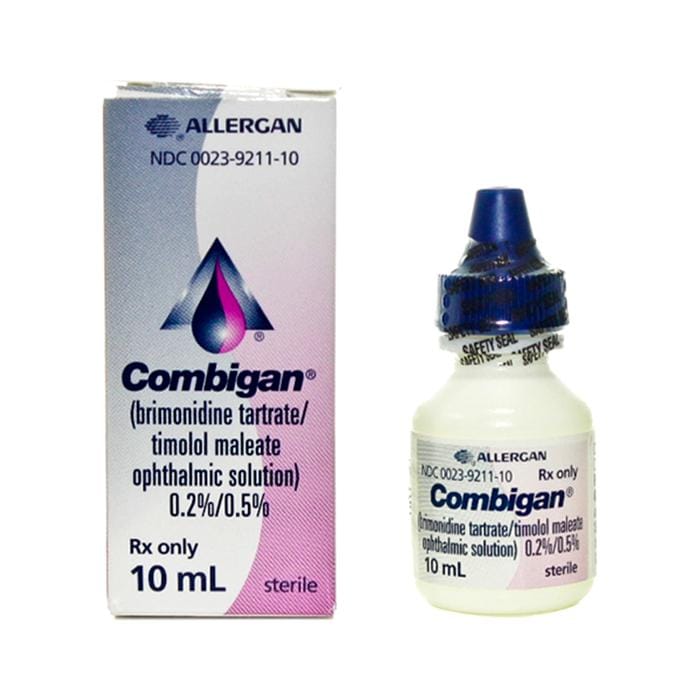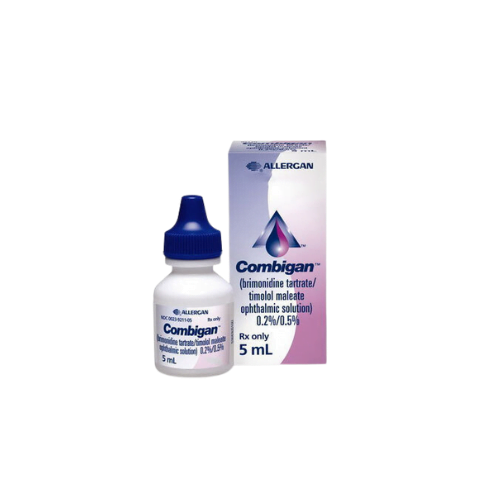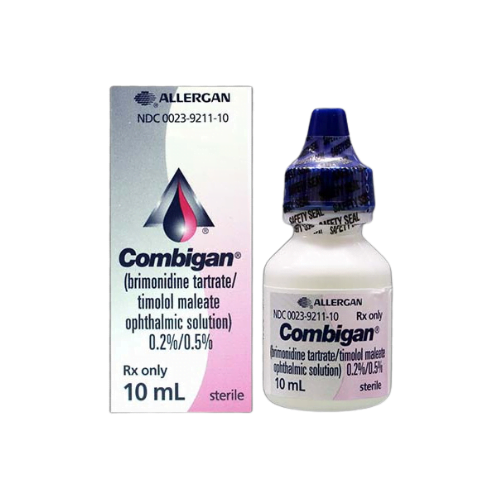Please note: a valid prescription is required for all prescription medication.
Combigan® Ophthalmic Solution for Glaucoma and Ocular Hypertension
Buy More, Save More: Get 20% off when you buy 3 or more of any one product using code LESS20 at checkout.
Applies to all products originating from Canada. Maximum allowable quantity equal to a 90-day supply per single order.
Price range: $35.99 through $79.99
Secure Encrypted Payments
Combigan® is a prescription eye drop used to lower elevated eye pressure in open-angle glaucoma and ocular hypertension. This page explains what it is, how it works, who it suits, and how to use it safely. We offer US shipping from Canada and clear options for those paying without insurance.
What Combigan Is and How It Works
Combigan is a fixed-dose combination of two well-studied agents for reducing intraocular pressure. It contains brimonidine tartrate, an alpha-2 adrenergic agonist, and timolol maleate, a nonselective beta blocker. Together, these components help decrease aqueous humor production; brimonidine may also increase uveoscleral outflow. The net effect is a reduction in eye pressure, which may help protect the optic nerve over time when used as directed.
Brimonidine tartrate timolol maleate ophthalmic solution is prescribed when a single agent is insufficient or when a simpler regimen is preferred. Border Free Health connects U.S. patients with licensed Canadian partner pharmacies; prescriptions are verified with prescribers before dispensing.
This medicine is used under the guidance of your clinician. Patients with certain heart or lung conditions need careful evaluation before starting any topical beta blocker. Review the official label and follow your prescriber’s instructions.
Who It’s For
The treatment is indicated to reduce elevated intraocular pressure in adults with open-angle glaucoma or ocular hypertension. It may be considered when monotherapy does not provide adequate pressure control or when a combination is clinically appropriate.
It is not suitable for everyone. Patients with asthma, severe chronic obstructive pulmonary disease, sinus bradycardia, second- or third-degree heart block, cardiogenic shock, or overt cardiac failure should not use a topical beta blocker component unless a prescriber determines benefits outweigh risks. Avoid use in neonates and infants; serious adverse events have been reported in very young patients with alpha-2 agonists. Discuss a history of depression, Raynaud’s phenomenon, hypotension, or hepatic or renal impairment with a healthcare professional.
Those with narrow angles require evaluation for angle-closure risk. If ocular allergy develops, the medicine may need to be discontinued and another therapy considered.
Dosage and Usage
Typical dosing follows the approved label: one drop in the affected eye or eyes twice daily, approximately 12 hours apart. Wash hands before use. Tilt the head back, pull down the lower eyelid to form a pocket, and instill one drop without touching the tip to the eye or skin.
To reduce systemic absorption, gently press a fingertip over the inner corner of the eye (nasolacrimal occlusion) for one to two minutes after instillation. If using other ophthalmic products, separate them by at least five minutes; apply gels or ointments last. Remove soft contact lenses before dosing and reinsert after 15 minutes.
Follow the official prescribing information for full directions. Do not change dose or frequency without your prescriber’s guidance.
Strengths and Forms
The class is supplied as a sterile ophthalmic solution in a dropper bottle. Availability can vary by market and manufacturer.
Combigan ophthalmic solution 0.2% 0.5% 5 mL is commonly dispensed; some markets may offer a 10 mL presentation. Final availability depends on the dispensing pharmacy and your prescription.
Missed Dose and Timing
If a dose is missed, instill it when remembered. If it is close to the next scheduled time, skip the missed dose and resume the regular twice-daily schedule. Do not double up drops. Aim for consistent morning and evening use about 12 hours apart.
If frequent doses are missed, speak with a prescriber about adherence strategies or whether an alternative regimen might be easier to follow.
Storage and Travel Basics
Store at room temperature as directed on the label. Keep the bottle tightly closed, upright when possible, and protected from contamination and excessive heat. Do not freeze. Keep out of reach of children and pets.
For travel, pack the bottle in a clean case inside your carry-on. Bring a copy of the prescription label for security screening. Avoid touching the dropper tip to any surface. If a bottle is damaged or contaminated, arrange a replacement. Many pharmacies apply a discard-after-opening date; follow the date provided by your pharmacist.
When shipping or traveling, temperature-controlled handling when required helps maintain product quality.
Benefits
This combination therapy helps lower intraocular pressure by acting on two targets. One bottle can simplify regimens compared with using two separate drops. A twice-daily schedule can be straightforward for many routines. Reducing drop burden may support adherence when the therapy fits clinical needs. Pressure reductions may help slow disease progression when used with regular monitoring.
Side Effects and Safety
- Eye redness or irritation
- Burning or stinging after instillation
- Dry mouth
- Blurred vision for a short time
- Fatigue or drowsiness
- Headache
- Eyelid inflammation or allergic conjunctivitis
Serious effects are less common but can occur, especially in patients with underlying conditions. Systemic beta-blocker effects may include bradycardia, hypotension, or bronchospasm. Alpha-2 agonists can cause somnolence, especially in children. Beta blockers may mask signs of hypoglycemia and hyperthyroidism. Severe allergic reactions, corneal changes, or breathing difficulties require urgent medical attention. Remove contact lenses before dosing because preservatives can be absorbed by soft lenses.
Report new or worsening symptoms promptly to a clinician.
Drug Interactions and Cautions
Potential interactions include monoamine oxidase inhibitors (contraindicated with brimonidine), tricyclic antidepressants, and other adrenergic agonists or antagonists. Caution is advised with oral beta blockers, calcium channel blockers, digoxin, and antihypertensives due to additive cardiovascular effects. Sedatives, alcohol, and CNS depressants may enhance drowsiness. Using another topical beta blocker concurrently is generally avoided.
Always provide your full medication list, including eye drops and over-the-counter products, to your prescriber and pharmacist.
What to Expect Over Time
Many patients see pressure reductions after starting therapy, with maintenance depending on consistent twice-daily use. Regular eye exams remain essential. A prescriber may adjust therapy if pressure targets are not reached, if side effects occur, or if disease status changes. Lifestyle steps that protect ocular surface health, such as proper contact lens hygiene and avoiding eye rubbing, can support comfort during long-term therapy.
Compare With Alternatives
Other prescription options can also lower eye pressure. A beta blocker paired with a carbonic anhydrase inhibitor is available as Cosopt. A prostaglandin analog like Xalatan is often used once daily and may be combined with additional agents when needed. Choice depends on target pressure, tolerability, and medical history. Discuss options if the current regimen is not meeting goals.
Pricing and Access
We list transparent options so patients can compare total costs for self-pay. Brimonidine tartrate timolol maleate 0.2% 0.5% price research often varies by source; Canadian pharmacy rates may differ from local retail. If you prefer cash-pay, you can review published options on the product page and proceed through checkout. We provide US delivery from Canada when permitted by law and prescription verification.
Looking to stretch your budget further? See active site offers on our Promotions page. Checkout is encrypted to help protect your information.
Availability and Substitutions
Supply can vary by manufacturer and market. If an item is temporarily unavailable, a prescriber may recommend a different combination or separate components. Combigan generic eye drops may be available in some regions; specific brands and presentations depend on the source pharmacy. Any substitution should match your prescription and be approved by your clinician.
Patient Suitability and Cost-Saving Tips
This therapy may suit adults who need dual-mechanism pressure control and prefer a single bottle. It may not suit those with reactive airway disease, certain heart rhythm issues, or intolerance to components. Patients sensitive to preservatives might ask about alternatives.
Cost-saving ideas include:
- Multi-month fills: Fewer refills can reduce per-order fees.
- Refill reminders: Set calendar alerts before the bottle runs out.
- Combine items: If approved, add other eye care items to one order.
- Pay out of pocket: Compare self-pay options to local retail totals.
- Ask about generics: Your prescriber can advise if suitable.
Questions to Ask Your Clinician
- Is a two-agent drop appropriate for my target eye pressure?
- How should I sequence these drops with other eye medicines?
- Do my heart or lung conditions change the safety profile?
- What signs suggest allergy or intolerance to this treatment?
- Should I avoid certain systemic medicines while using these drops?
- How often should I check pressure and optic nerve status?
- Are preservative-free options appropriate if irritation occurs?
Authoritative Sources
Health Canada Drug Product Database
Ready to proceed? You can order these eye drops online with prompt, express shipping. Always use as prescribed and follow your clinician’s guidance.
Express Shipping - from $25.00
Shipping with this method takes 3-5 days
Prices:
- Dry-Packed Products $25.00
- Cold-Packed Products $35.00
Shipping Countries:
- United States (all contiguous states**)
- Worldwide (excludes some countries***)
Standard Shipping - $15.00
Shipping with this method takes 5-10 days
Prices:
- Dry-Packed Products $15.00
- Not available for Cold-Packed products
Shipping Countries:
- United States (all contiguous states**)
- Worldwide (excludes some countries***)
Can I wear contact lenses while using Combigan?
Remove contact lenses before applying Combigan and wait at least 15 minutes before reinserting them to prevent irritation.
What should I do if I miss a dose of Combigan?
Apply the missed dose as soon as you remember, but if it is close to your next dose, skip the missed one. Do not double up.
Can Combigan affect my blood pressure?
Yes, it may cause slight lowering of blood pressure. Inform your doctor if you experience dizziness or fainting.
Is Combigan safe for long-term use?
Combigan is often used long term in glaucoma management, but regular eye checkups are essential to monitor its effectiveness and safety.
Can Combigan cause blurry vision?
Temporary blurred vision may occur after applying the drops. Avoid driving or using machinery until your vision clears.
How soon after opening should the bottle be discarded?
Follow the discard date provided by your pharmacist or clinic. Many ophthalmic solutions are used within four weeks of opening to reduce contamination risk, but labeling and pharmacy policies can vary. Keep the cap tightly closed, avoid touching the dropper tip, and store the bottle at room temperature as directed. If the solution becomes cloudy, changes color, or the bottle is damaged, seek a replacement. When in doubt, ask your pharmacist for a specific discard-after-opening date.
Can contact lens wearers use these drops safely?
Yes, but timing matters. Remove soft contact lenses before dosing because preservatives in many eye drops can be absorbed by lenses. Instill one drop, perform gentle nasolacrimal occlusion, and wait at least 15 minutes before reinserting lenses. If irritation persists, discuss lens type, wearing schedule, and potential preservative-free alternatives with your prescriber. Always avoid touching the dropper tip to the eye or lens to keep the solution sterile.
Is this medicine appropriate for children?
This combination is intended for adults. Alpha-2 agonists such as brimonidine have been associated with serious adverse events in very young children, including somnolence and apnea. Use in neonates and infants is not recommended. If a pediatric patient needs pressure-lowering therapy, a pediatric ophthalmologist should guide selection and monitoring. For adolescents, suitability depends on medical history and risk factors; the prescriber will determine the safest approach.
Can it cause drowsiness or affect driving?
Drowsiness, fatigue, or blurred vision can occur, especially shortly after instillation. Until the individual response is known, patients should be cautious with driving or operating machinery. Some systemic effects of beta blockers and alpha-2 agonists may contribute to tiredness. If persistent sedation or visual disturbance occurs, contact the prescriber to consider adjustments or an alternative therapy. Avoid alcohol or sedatives that may intensify these effects unless a clinician advises otherwise.
What if I am already on an oral beta blocker?
Using a topical beta blocker while taking an oral beta blocker can increase the risk of slow heart rate or low blood pressure. The prescriber will consider overall cardiovascular status before recommending a regimen. Do not stop any systemic medicine without medical advice. Provide a full medication list, including eye drops and supplements, at each visit so potential interactions can be reviewed and monitored.
Does it change eye color or eyelashes?
Eye color and eyelash changes are typically associated with prostaglandin analog drops, not with this alpha-2 agonist and beta-blocker combination. Common local effects here may include redness, irritation, or dry mouth. If unexpected changes to the ocular surface, lids, or lashes occur, report them to your eye care professional. The clinician can evaluate whether the symptoms are related to the drop or another condition and adjust the plan if needed.
How should I switch from separate drops to a combination?
Switching between regimens should be directed by your prescriber. In many cases, clinicians discontinue the prior agents and begin the combination at the next scheduled dosing time, but plans vary based on response and tolerability. Maintain the instructed twice-daily schedule and spacing with other eye products. Arrange follow-up to check intraocular pressure and comfort after the change. Do not overlap similar classes unless your clinician specifically advises it.
Rewards Program
Earn points on birthdays, product orders, reviews, friend referrals, and more! Enjoy your medication at unparalleled discounts while reaping rewards for every step you take with us.
You can read more about rewards here.
POINT VALUE
How to earn points
- 1Create an account and start earning.
- 2Earn points every time you shop or perform certain actions.
- 3Redeem points for exclusive discounts.
How to book an appointment
- 1Create Begin by completing a profile or log into your existing account. This step ensures we have the necessary information to provide you with a service that's tailored to your needs. account and start earning.
- 2Scheduling an appointment with our online booking system is easy. Pick a day and time that suits you. You’ll receive an immediate confirmation, without the wait.
- 3Discuss your concerns and symptoms and receive a thorough diagnosis from one of our licensed doctors during a confidential video appointment.
- 4If you've been prescribed medication, your Rx is sent directly to one of our licensed pharmacies and delivered right to your door.
Get Started
To book an online doctor appointment, register for an account or login. After doing so, you can book your visit on this page.


